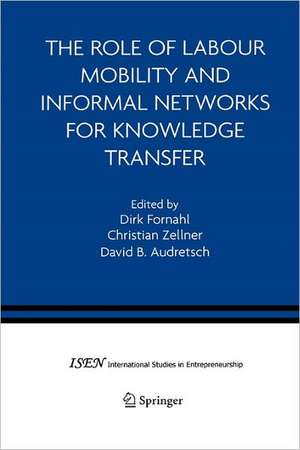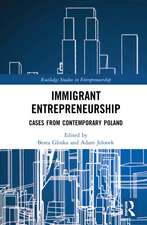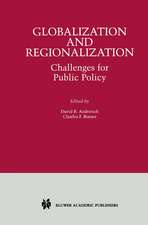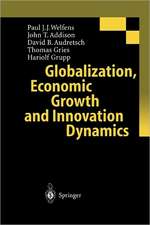The Role of Labour Mobility and Informal Networks for Knowledge Transfer: International Studies in Entrepreneurship, cartea 6
Editat de Dirk Fornahl, Christian Zellner, David B. Audretschen Limba Engleză Paperback – 6 dec 2010
No field in economics has dealt extensively with the microeconomics of knowledge spillovers. This volume brings together scholars from a broad spectrum of fields including labor economics, regional economics, the economics of innovation and technological change, and sociology to introduce new insights yielded from the microfoundations of knowledge spillovers.
| Toate formatele și edițiile | Preț | Express |
|---|---|---|
| Paperback (1) | 637.28 lei 6-8 săpt. | |
| Springer Us – 6 dec 2010 | 637.28 lei 6-8 săpt. | |
| Hardback (1) | 643.99 lei 6-8 săpt. | |
| Springer Us – 19 noi 2004 | 643.99 lei 6-8 săpt. |
Din seria International Studies in Entrepreneurship
-
 Preț: 362.53 lei
Preț: 362.53 lei - 17%
 Preț: 428.32 lei
Preț: 428.32 lei - 15%
 Preț: 642.68 lei
Preț: 642.68 lei - 15%
 Preț: 640.55 lei
Preț: 640.55 lei - 15%
 Preț: 637.78 lei
Preț: 637.78 lei - 18%
 Preț: 951.29 lei
Preț: 951.29 lei - 15%
 Preț: 644.30 lei
Preț: 644.30 lei - 18%
 Preț: 947.85 lei
Preț: 947.85 lei - 15%
 Preț: 643.99 lei
Preț: 643.99 lei - 15%
 Preț: 642.51 lei
Preț: 642.51 lei - 18%
 Preț: 953.65 lei
Preț: 953.65 lei - 18%
 Preț: 949.73 lei
Preț: 949.73 lei - 15%
 Preț: 637.59 lei
Preț: 637.59 lei - 15%
 Preț: 642.51 lei
Preț: 642.51 lei - 15%
 Preț: 642.68 lei
Preț: 642.68 lei - 18%
 Preț: 952.72 lei
Preț: 952.72 lei - 18%
 Preț: 951.47 lei
Preț: 951.47 lei - 18%
 Preț: 944.82 lei
Preț: 944.82 lei - 18%
 Preț: 947.67 lei
Preț: 947.67 lei - 18%
 Preț: 949.42 lei
Preț: 949.42 lei - 15%
 Preț: 632.05 lei
Preț: 632.05 lei - 15%
 Preț: 638.57 lei
Preț: 638.57 lei - 18%
 Preț: 948.16 lei
Preț: 948.16 lei - 18%
 Preț: 954.45 lei
Preț: 954.45 lei - 18%
 Preț: 1226.42 lei
Preț: 1226.42 lei - 18%
 Preț: 951.47 lei
Preț: 951.47 lei
Preț: 637.28 lei
Preț vechi: 749.73 lei
-15% Nou
Puncte Express: 956
Preț estimativ în valută:
121.95€ • 126.60$ • 101.69£
121.95€ • 126.60$ • 101.69£
Carte tipărită la comandă
Livrare economică 22 martie-05 aprilie
Preluare comenzi: 021 569.72.76
Specificații
ISBN-13: 9781441935793
ISBN-10: 1441935797
Pagini: 218
Ilustrații: XII, 218 p.
Dimensiuni: 155 x 235 x 12 mm
Greutate: 0.33 kg
Ediția:Softcover reprint of hardcover 1st ed. 2005
Editura: Springer Us
Colecția Springer
Seria International Studies in Entrepreneurship
Locul publicării:New York, NY, United States
ISBN-10: 1441935797
Pagini: 218
Ilustrații: XII, 218 p.
Dimensiuni: 155 x 235 x 12 mm
Greutate: 0.33 kg
Ediția:Softcover reprint of hardcover 1st ed. 2005
Editura: Springer Us
Colecția Springer
Seria International Studies in Entrepreneurship
Locul publicării:New York, NY, United States
Public țintă
ResearchCuprins
Introduction: Structuring Informal Mechanism Of Knowledge Transfer.- Geographic and Relational Proximity.- The Spatial Distribution of Entrepreneurial Support Networks: Evidence from Semiconductor Initial Public Offerings from 1996 through 2000.- 4 The Impact of Regional Social Networks on the Entrepreneurial Development Process.- Social Networks, Informational Complexity and Industrial Geography*.- Transnational Networks and The Evolution of the Indian Software Industry:.- The Mobility of Economic Agents as Conduits of Knowledge Spillovers.- Scientific knowledge flows and labour mobility.- Firm Placements of New PhDs: Implications for Knowledge Transfer.- Basic Research, Labour Mobility and Competitiveness.- Science-Industry Relationships in France: Entrepreneurship and Innovative Institutions.- Knowledge Creation And Flows In Science.
Notă biografică
Dirk Fornahl studied economics and business administration at the University of Hannover (Germany), at the Dublin City University (Dublin, Ireland) and at the University of California (Berkeley, USA) with a focus on Economic Policy, Environmental Economics and Systems Management, and Labour Economics. Since 1999 Research Associate at the Max Planck Institute for Research into Economic Systems, Evolutionary Economics Group. From June 1999 until May 2001 working in the 'InnoRegio' programme of the Federal Ministry of Education and Science.
Christian Zellner studied development economics at the University of Kent and the University of Cambridge (United Kingdom). He has worked as a Research Associate in the Evolutionary Economics Group at the Max Planck Institute for Research into Economic Systems (Germany) since 2000. His research mainly focuses on the formation of human capital and embodied knowledge transfers. He received his Ph.D. from the Friedrich Schiller University Jena in 2003 for a thesis on the effects of basic research on the dynamics of the innovation process.
David B. Audretsch is the Director of the Research Unit on Entrepreneurship, Growth and Public Policy at the Max Planck Institute for Research into Economics Systems in Germany and a Research Fellow of the Centre for Economic Policy Research (London). He also serves as the Ameritech Chair of Economic Development at Indiana University. Audretsch's research has focused on the links between entrepreneurship, government policy, innovation, economic development and global competitiveness. He has consulted with the World Bank, National Academy of Sciences, U.S. State Department, United States Federal Trade Commission, General Accounting Office and International Trade Commission as well as the United Nations, Commission of the European Union, the European Parliament, the OECD, as well as numerous private corporations, state governments, and a number of European Governments. He is a member of the Advisory Board to a number of international research and policy institutes, including the Zentrum fuer Europaeisch Wirtschaftsforschung (ZEW, Centre for Economic Research), Mannheim, the Hamburgisches Welt-Wirtschafts-Archiv (HWWA, Hamburg Institute of International Economics), the Swedish Foundation for Research on Entrepreneurship and Small Business, and the American Institute for Contemporary German Studies (AICGS), Washington, D.C. His research has been published in over one hundred scholarly articles in the leading academic journals. He has published thirty books including, Innovation and Industry Evolution, with MIT Press. He is co-founder and co-editor of Small Business Economics: An International Journal. He was awarded the 2001 International Award for Entrepreneurship and Small Business Research by the Swedish Foundation for Small Business Research.
Christian Zellner studied development economics at the University of Kent and the University of Cambridge (United Kingdom). He has worked as a Research Associate in the Evolutionary Economics Group at the Max Planck Institute for Research into Economic Systems (Germany) since 2000. His research mainly focuses on the formation of human capital and embodied knowledge transfers. He received his Ph.D. from the Friedrich Schiller University Jena in 2003 for a thesis on the effects of basic research on the dynamics of the innovation process.
David B. Audretsch is the Director of the Research Unit on Entrepreneurship, Growth and Public Policy at the Max Planck Institute for Research into Economics Systems in Germany and a Research Fellow of the Centre for Economic Policy Research (London). He also serves as the Ameritech Chair of Economic Development at Indiana University. Audretsch's research has focused on the links between entrepreneurship, government policy, innovation, economic development and global competitiveness. He has consulted with the World Bank, National Academy of Sciences, U.S. State Department, United States Federal Trade Commission, General Accounting Office and International Trade Commission as well as the United Nations, Commission of the European Union, the European Parliament, the OECD, as well as numerous private corporations, state governments, and a number of European Governments. He is a member of the Advisory Board to a number of international research and policy institutes, including the Zentrum fuer Europaeisch Wirtschaftsforschung (ZEW, Centre for Economic Research), Mannheim, the Hamburgisches Welt-Wirtschafts-Archiv (HWWA, Hamburg Institute of International Economics), the Swedish Foundation for Research on Entrepreneurship and Small Business, and the American Institute for Contemporary German Studies (AICGS), Washington, D.C. His research has been published in over one hundred scholarly articles in the leading academic journals. He has published thirty books including, Innovation and Industry Evolution, with MIT Press. He is co-founder and co-editor of Small Business Economics: An International Journal. He was awarded the 2001 International Award for Entrepreneurship and Small Business Research by the Swedish Foundation for Small Business Research.
Textul de pe ultima copertă
The purpose of The Role of Labour Mobility and Informal Networks for Knowledge Transfer is to analyze the microfoundations of knowledge spillovers. The microeconomic analysis of knowledge spillovers leads to the insight that the spillover and flow of knowledge is not at all automatic. Instead, this volume suggests that a filter exists between knowledge and its economic application. The focus of The Role of Labour Mobility is on several key mechanisms that serve to reduce this filter and facilitate the flow of knowledge. In particular, the volume draws on an emerging literature identifying the role of knowledge spillovers to investigate significance of labour mobility and informal networks as mechanisms facilitating the flow of knowledge.
No field in economics has dealt extensively with the microeconomics of knowledge spillovers. Thus, it is important to include the perspectives and insights of research approaches that span a broad spectrum of fields in economics. This work brings together scholars from labor economics, regional economics, the economics of innovation and technological change, and sociology to introduce new insights yielded from the microfoundations of knowledge spillovers.
No field in economics has dealt extensively with the microeconomics of knowledge spillovers. Thus, it is important to include the perspectives and insights of research approaches that span a broad spectrum of fields in economics. This work brings together scholars from labor economics, regional economics, the economics of innovation and technological change, and sociology to introduce new insights yielded from the microfoundations of knowledge spillovers.
Caracteristici
Analyses the microfoundations of knowledge transfer Provides explicit conceptualization of knowledge transfer based on informal networks and labour mobility Includes supplementary material: sn.pub/extras























